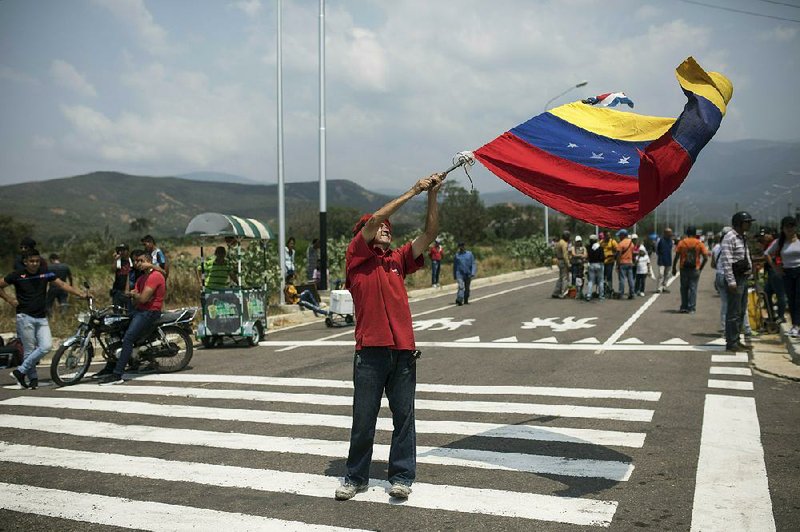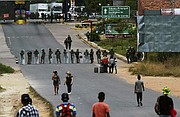The political showdown in Venezuela escalated into deadly violence near the border with Brazil on Friday, as security forces fired on a group of indigenous Venezuelans protesting the government's determination to block aid deliveries from outside the country.
Witnesses and local officials reported the confrontation a day after Venezuelan President Nicolas Maduro, facing the biggest challenge of his political career, ordered all crossings at the Brazil border closed.
At least two civilians were killed and more than a dozen wounded in the confrontation with security forces in the Gran Sabana area, along Venezuela's southeast border with Brazil, according to Americo de Grazia, an opposition lawmaker from the state of Bolivar. The Gran Sabana area is inhabited by the Pemon, an indigenous community.
The Venezuelans were protesting the government's decision to halt all unauthorized imports of emergency food and medical aid into Venezuela, which is suffering increasingly severe shortages. The opposition has vowed to deliver tons of donated humanitarian aid today, even against Maduro's orders.
Ricardo Delgado, a Pemon leader, said the tensions that led to the confrontation began in the pre-dawn hours when a convoy from the army and the National Guard attempted to reach a checkpoint on the border to help protect it. A group of indigenous protesters blocked their passage, because they want the aid to enter.
Delgado said he told convoy officers that they could not pass, and they left. But hours later, he said, the convoy returned, this time shooting at the indigenous group blocking the streets.
"I was sleeping and the shooting woke me up," he said.
In videos posted on Friday from Santa Elena de Uairen, a border crossing town in the Gran Sabana region, dozens of military police holding shields could be seen blocking the roadway. A small crowd of protesters gathered, singing Venezuela's national anthem and chanting, "They are killing us with hunger."
The political opposition, led by Juan Guaido, the head of the National Assembly who declared himself president last month, has vowed to forcibly bring in aid this weekend. He has the backing of foreign allies, led by the United States.
Maduro has said Venezuela is not a country of "beggars" and does not need the aid, and has called Guaido a stooge of President Donald Trump's administration.
Maduro posted a video on his Twitter account Friday with scenes of ample medical supplies and health care workers listening to his instructions.
"We are making every effort to make the national public health system not stop and rise to the highest level in the world," Maduro wrote.
But Venezuela is reeling from its worst economic crisis ever, with deep-seated hunger, shortages and hyperinflation that Maduro's opponents have blamed on corruption and mismanagement. More than 3 million Venezuelans have fled in recent years.
The biggest potential flash point is the bridge at Cucuta, Colombia, a major border crossing where Venezuelan authorities have blocked the lanes with tanker trucks and fencing. The United States and other foreign powers have been stockpiling goods on the Colombian side of the bridge.
International groups have warned that clashes at the border could have far-reaching effects. Jason Marczak, director of the Adrienne Arsht Latin America Center at the Atlantic Council, a Washington-based policy research group, called it a "critical moment."
"Venezuela's borders are a powder keg with sky-high tensions, meaning that any errant move could unleash a wave of violence," he said. "The key question is who will blink first."
Venezuelan opposition leaders and their allies in Brazil were scrambling on Friday to find trucks and drivers to transport 500 kits of food and medicine that they hope to get across the border today.
If the trucks manage to get across, the opposition plans to offload the cargo on the Venezuelan side so aid packages can reach nearby communities.
The amount of aid on hand would support the basic needs of about 2,000 people for a couple of months, according to Maria Teresa Belandria, an opposition leader who serves as Guaido's envoy to Brazil.
The transport of even a token amount of aid across the border is seen by opposition activists as a powerful symbol that could lead to a more robust aid effort by land, sea and air.
"If we manage to get aid through, it will mean the armed forces have agreed to put themselves on the side of the constitution," Belandria said in an interview.
A Section on 02/23/2019

